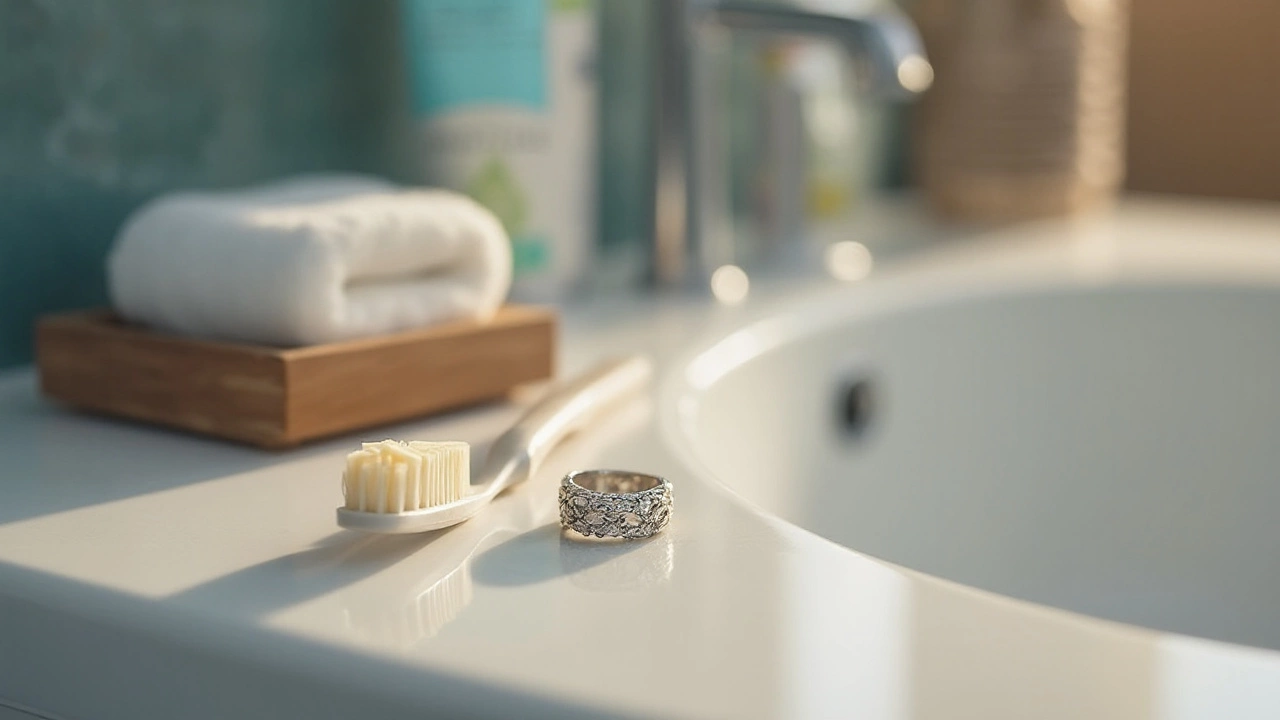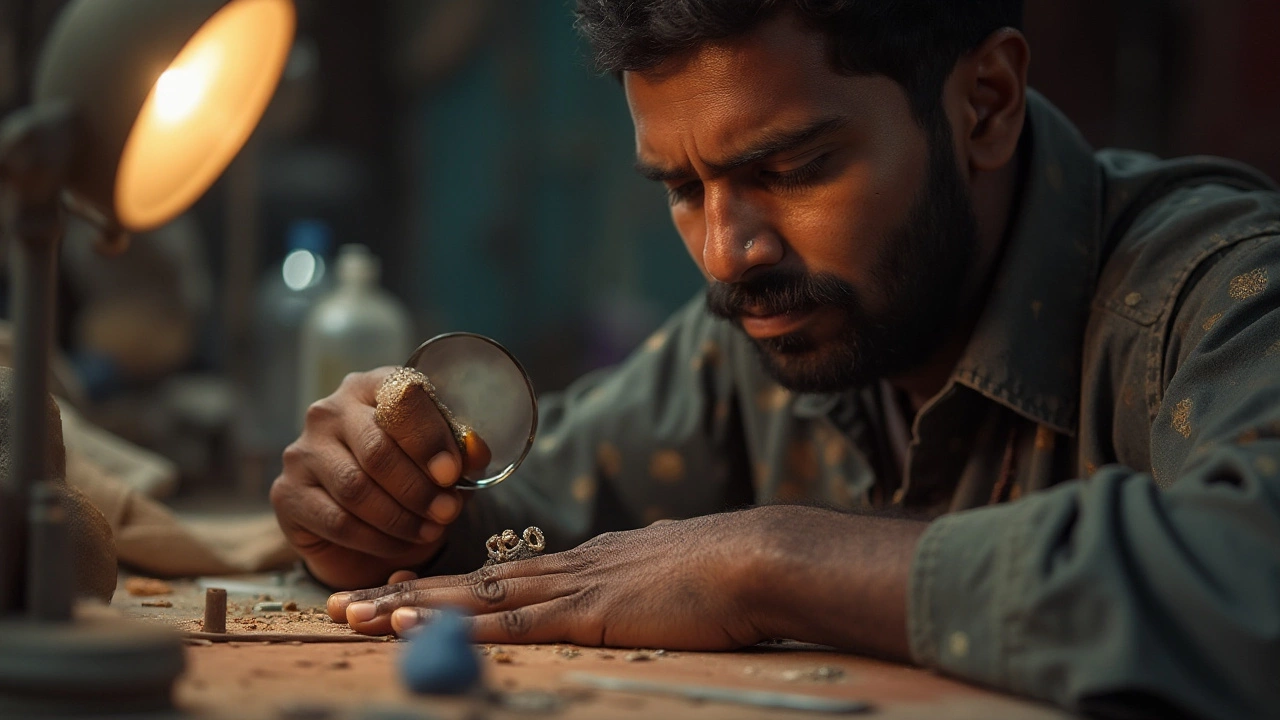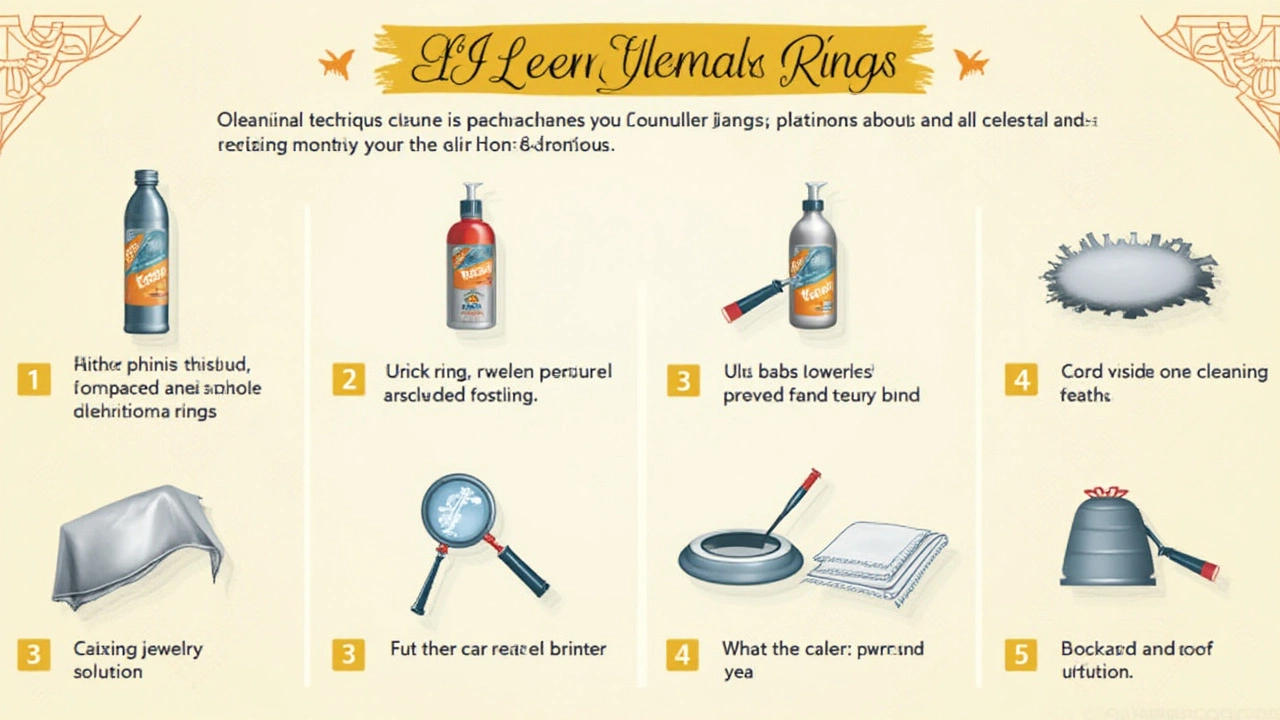
Platinum rings, with their elegant sheen and timeless beauty, are a cherished possession for many. The question often arises: can you clean this precious metal with something as simple as toothpaste? While toothpaste is a common household item, using it on platinum may not be the best idea. This common cleaner often contains abrasives meant for scrubbing off plaque, which could be too harsh for your delicate jewelry.
It's essential to understand what makes up both toothpaste and platinum to discern whether they're compatible. Platinum is prized not just for its radiance but also for its durability and resistance to tarnish. Meanwhile, the active ingredients in toothpaste are optimized for teeth, not precious metals. This article will delve into safer alternatives and tips for keeping your jewelry gleaming without running the risk of scratches or dullness.
- The Composition of Toothpaste and Its Effects on Platinum
- Alternative Cleaning Methods for Platinum Rings
- Tips for Maintaining the Shine of Your Platinum Jewelry
- Professional Cleaning Services vs. DIY Methods
The Composition of Toothpaste and Its Effects on Platinum
Toothpaste is a common household item designed primarily to maintain oral hygiene. It's composed of various ingredients, each with a specific purpose aimed at cleaning teeth and freshening breath. The most significant component is the abrasive agent, such as calcium carbonate or silica, intended to remove plaque from tooth surfaces. While it's effective on enamel, this abrasive quality raises concerns when considering its use on platinum jewelry. The surface of platinum, although resilient, can be susceptible to micro-scratches if cleaned with abrasive materials, potentially diminishing its shine over time.
Beyond abrasives, toothpaste typically contains fluoride, detergents, flavoring agents, and humectants. Fluoride helps in preventing cavities in teeth but has no beneficial effect on metals like platinum. Detergents such as sodium lauryl sulfate create the foaming action and aid in dispersing the paste during brushing. These detergents can be too harsh when applied to platinum rings, possibly stripping them of their natural oils and luster. An ordinary toothbrush's bristles can also contribute to physical wear if used improperly on jewelry.
According to jewelry care experts, it's recommended to steer clear of toothpaste when it comes to platinum maintenance. A statement from the Gemological Institute of America (GIA) suggests, "Using toothpaste for jewelry cleaning might scratch metals and gemstones. Always opt for a gentle cleaner specifically made for jewelry.” This emphasizes the necessity of choosing the right cleaning agent that aligns with the characteristics of your ornaments. Modern pastes often include whitening agents such as hydrogen peroxide or baking soda, which can exacerbate the abrasive effect.
Interestingly, many individuals mistakenly believe that the creamy texture of toothpaste makes it a gentle cleaner for fragile surfaces. However, it is the tiny, inconspicuous particles within that contribute to most of the damage endured. With frequent use, the accumulated abrasions can result in a dull and uneven surface, leading to a loss of reflectivity and brilliance of the platinum jewelry. To maintain your ring’s allure and value, it's critical to understand what household items might cause more harm than good.
Some individuals attempt homemade solutions as an alternative to professional cleaning, combining toothpaste with other substances. While this DIY mindset can be rewarding, it's important to approach it with caution. Mixing toothpaste with substances like lemon juice or vinegar, which contain acid, can further erode the finish of a platinum ring. Gentle professional-grade cleaners or even lukewarm soapy water should be favored over such risky experiments.

Alternative Cleaning Methods for Platinum Rings
When it comes to cleaning your beloved platinum rings, there's a world beyond toothpaste that offers safer and equally effective solutions. Household ingredients can work wonders, ensuring that your rings maintain their allure without risking damage. One of the simplest methods involves using a gentle soap, free of harsh chemicals, combined with warm water. You'd be amazed by the shine a little warm soapy water can bring back. Immerse your ring in the solution for 15-20 minutes to allow the dirt to loosen. Once the soaking is complete, use a soft-bristled toothbrush to gently brush away any lingering grime, especially in those often-neglected crevices. Rinse thoroughly under warm running water and pat dry with a soft lint-free cloth. This gentle approach respects the metal's integrity while restoring its brilliance.
For those who want to go a step further, a mixture of baking soda and water can be an alternative. Create a paste with three parts baking soda and one part water. Gently apply it onto the ring with a soft cloth, being cautious to avoid firm pressure. Baking soda's mild abrasiveness effectively removes grime without the risks posed by harsher substances found in some cleaning products. Once you've finished, rinse away the residue thoroughly to prevent any accumulation that may dull the metal over time. Again, dry your ring with a soft cloth. These safe and accessible options ensure that your ring remains pristine, without the repercussions of more abrasive cleaning tactics.
Vinegar Solution
Another popular cleaning method is using a vinegar solution, which holds particular appeal for its natural cleaning properties. Mix equal parts of white vinegar and water, and let your platinum ring soak for around 15 minutes. Vinegar's acetic acid helps in breaking down any mineral deposits and residues that might have accumulated over time. After soaking, a gentle scrub with a non-abrasive cloth or brush can remove persistent dirt, restoring the jewelry's natural shine. Rinse well to remove any vinegar traces and dry properly—an important step to avoid any moisture-related deterioration."Platinum is one of the most enduring precious metals," says renowned jeweler John Smithson, "but caring for it correctly ensures it lasts generations." These natural methods highlight that elegance doesn't need to come at the expense of harsh chemicals or expensive cleaning solutions.
Commercial Cleaners
If you prefer ready-made solutions, several commercial cleaners cater specifically to platinum's unique requirements. Opt for a cleaner labeled safe for platinum and follow the instructions carefully. These products are formulated to provide a deep clean while preserving the ring's integrity, and they often come with assurances from manufacturers regarding their safety and effectiveness. Nevertheless, it's advisable to test any cleaner on a less visible area of the ring before complete application, ensuring no adverse reactions. While commercial cleaners can offer convenience, understanding your ring's specific needs and the ingredients in these products is crucial for long-term care and maintenance.
Remember, the key to maintaining the beauty of your platinum jewelry is regular and gentle cleaning. By adopting these methods, you ensure the lasting appeal of your cherished pieces, celebrating their timeless charm for years to come.

Tips for Maintaining the Shine of Your Platinum Jewelry
Ensuring your platinum jewelry retains its brilliance demands a blend of care and understanding of the metal’s unique characteristics. Platinum is celebrated for its durability, making it less prone to damage compared to other precious metals. Yet, as with any cherished item, it needs the right upkeep to maintain its allure. One fundamental tip is routine cleaning; this involves regular, gentle washing with mild dish soap and warm water. It’s best to use a soft-bristled brush, such as a child’s toothbrush, to gently remove any grime. Make sure to rinse thoroughly to remove any soap residue and pat your piece dry with a lint-free cloth to avoid water spots.
To preserve the shine of your platinum jewelry, consider storing your pieces properly when not in use. Utilize a soft pouch or separate compartment in your jewelry box to avoid unnecessary scratches, which can occur if platinum comes into contact with harder gemstones like diamonds. It's wise to also remove platinum rings when engaging in activities that involve harsh chemicals – cleaning agents, chlorine in pools, or even everyday skincare products with certain acids can diminish the sheen of your ring.
Consider scheduling professional cleaning and inspection annually. Jewelers possess the expertise and specialized equipment to spruce up your items while checking for any loosened settings or potential damage. During these visits, they can polish your platinum jewelry, removing any minor scratches incurred over time, thus restoring its surfaces to a radiant finish. Emily Robertson, a seasoned jeweler with over two decades of experience, advises, "Regular check-ups with a trusted professional can save you from future heartache and expenses due to unseen damage."
If you are drawn to DIY methods, ensure any cleaning solutions you use are pH-balanced and non-abrasive. Some jewelers recommend soaking platinum rings in a quick bath of clean soap water, followed by a gentle scrub, as one of the exhaustive methods. Always approach with caution and avoid ultrasonic cleaners for pieces with gemstones, as vibrations might loosen the settings. A quick checklist of these steps includes:
- Soak in mild soap water for 20-30 minutes.
- Gently scrub with a soft-bristled brush.
- Rinse thoroughly with warm water.
- Pat dry with a lint-free, soft cloth.
To further prevent wear, it is sensible to limit your platinum jewelry's exposure to extreme temperatures and sudden physical impacts. While this remarkable metal can handle daily wear, sudden stress can cause micro-scratches or dents that over time dull the surface. A fascinating piece of trivia worth noting is that platinum, due to its density, tends to patina with age, a quality many aficionados truly appreciate for its vintage charm.

Professional Cleaning Services vs. DIY Methods
If you own a stunning platinum ring, you're likely aware of the delicate nature of this precious metal, and you know that regular cleaning is essential to maintain its allure. Deciding between professional cleaning services and do-it-yourself (DIY) methods can be a tough choice. Both have their merits, but it's important to weigh the specific needs of your jewelry against convenience and cost.
Professional Cleaning Services
Taking your platinum jewelry to professional cleaning services can be seen as a guarantee for the best care. Experts in jewelry maintenance possess specialized equipment and knowledge that ensures your ring comes back looking as radiant as the day you first wore it. They use ultrasonic cleaners that send high-frequency sound waves through a cleaning solution, effectively removing dirt without causing any damage to the platinum. Additionally, they have access to steam cleaners that can reach those nooks and crannies where grime loves to settle.
When you opt for professional cleaning, you're also placing your trust in trained eyes to spot any potential issues with your ring that you might miss. Loose settings, minor scratches, or beginning signs of wear and tear are swiftly identified and addressed, which can save you from costly repairs later. According to jewelry industry expert Sarah Forbes,
"Investing in professional services not only maintains the aesthetic of your piece but also ensures its structural integrity."With such attention to detail, the process does come at a cost, often reflecting both the service and the expertise being provided.
DIY Methods
On the other hand, DIY cleaning methods offer a pocket-friendly alternative and are favored by those who enjoy taking personal care of their belongings. One popular method includes a simple solution of warm water and mild soap, soaking your ring and gently brushing it with a soft-bristle toothbrush. This non-abrasive approach can help you remove surface dirt and retain the shine of your jewel without any harsh chemicals.
- Mixing a few drops of dishwashing liquid into a small bowl of lukewarm water.
- Let your ring soak for about 20-30 minutes to loosen any filth.
- Gently brush with a soft toothbrush to access grooves.
- Rinse with clean water and dry with a soft cloth.
However, DIY methods do have their limitations. It's essential to exercise caution, avoiding any substances that could cause harm. For instance, toothpaste might seem harmless at first for ring maintenance tips, but its abrasives can lead to microscopic scratches on the surface of the platinum. Also, these at-home methods lack the precision tools that professionals leverage to ensure cleanliness without damage. If you're aware of these constraints, and your ring doesn't have intricate details or gemstones, DIY steps can be a fantastic method for maintaining sheen between professional cleanings.
Ultimately, whether you choose professional services or a DIY approach, the goal remains the same: keeping your platinum rings in the best possible condition to celebrate the moments they commemorate.




